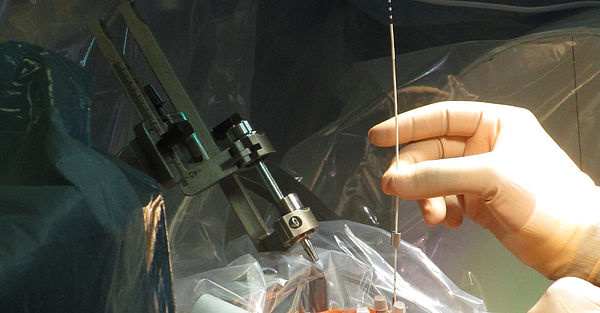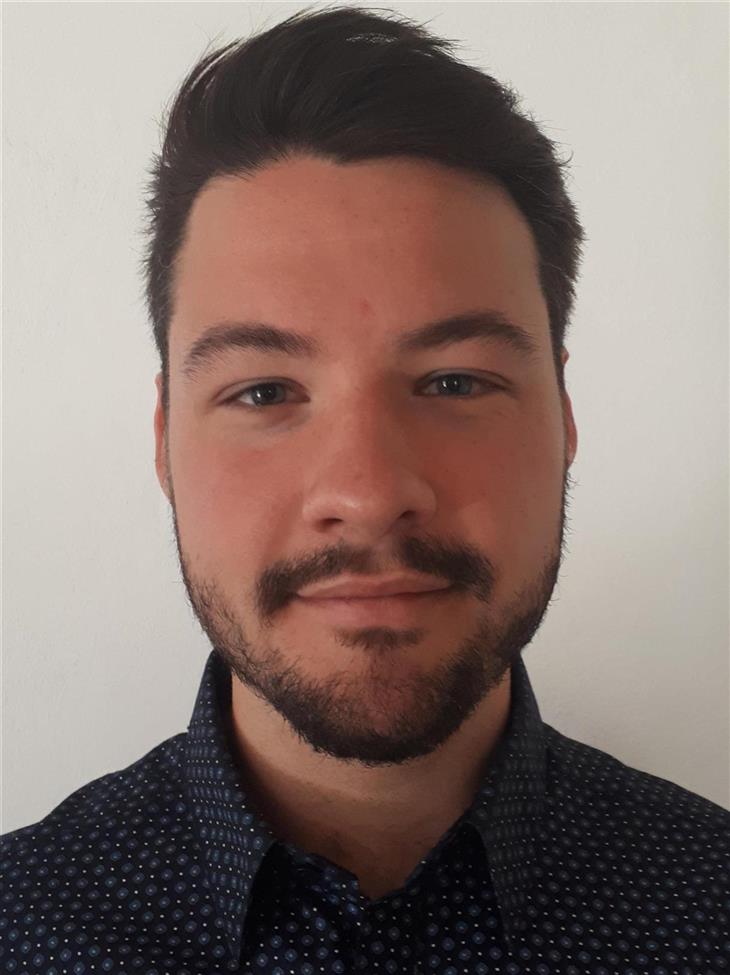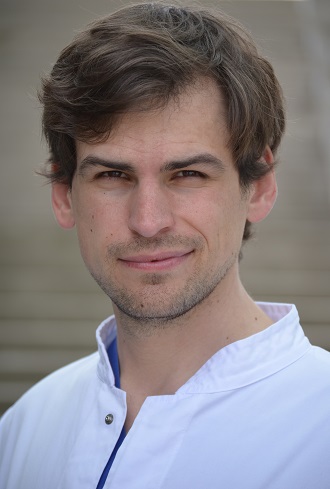

Unsere Arbeitsgruppe erforscht die neuronalen Mechanismen, die höheren kognitiven Prozessen wie Aufmerksamkeit oder Gedächtnis zugrunde liegen. Insbesondere gehen wir der Frage nach, wie es dem Gehirn gelingt, aus den sich unablässig ändernden Gehirnwellen einen zeitlich zusammenhängenden Sinneseindruck entstehen zu lassen. Unser Interesse konzentriert sich dabei vor allem auf den präfrontalen Kortex, von dem wir vermuten, dass er die entscheidende Rolle bei der Integration, Interpretation und Umsetzung eines daraus folgenden Handlungsplanes spielt. Dazu untersuchen wir vor allem periodische Fluktuationen im Verhalten (z.B. natürliche Schwankungen der Aufmerksamkeit) als direkten Spiegel der zugrundeliegenden neuronalen Oszillationen. Das Verhalten beeinflusst aber auch das Gehirn selbst, so dass sich z.B. neuronalen Oszillationen im darauffolgenden Schlaf verändern und so Erinnerungen abgelegt werden. Sowohl im Wachzustand als auch im Schlaf arbeitet eine Gehirnregion nie alleine, sondern immer in einem komplexen Netzwerk aus kortikalen und subkortikalen Strukturen. Eine krankheitsbedingte Veränderung in einer Region oder im gesamten Netzwerk kann diese Zusammenarbeit stören und zu Einschränkungen in Konzentration und Merkfähigkeit führen. Um zu verstehen, wie verschiedene neurologische und psychiatrische Erkrankungen höhere kognitive Prozesse beeinflussen, untersuchen wir neben gesunden Probanden auch verschiedene Patientenpopulationen.
Eine ausführliche Beschreibung der Ziele unserer Forschung finden Sie hier in englischer Sprache.
Interessenten für eine Abschlussarbeit (Bachelor/Master), eine Doktorarbeit (Ph.D. oder Dr. med.) oder eine Postdoc-Stelle in unserer Gruppe schicken bitte eine E-Mail mit Ihren Forschungsinteressen und Lebenslauf an randolph.helfrichmed.uni-tuebingen.de oder schauen unter "Stellenangebote".
Weitere Informationen: www.helfrich-lab.com
Google Scholar: scholar.google.de/citations
Twitter: twitter.com/HelfrichLab
In English only
I. Rhythmic building blocks of human attention: How network oscillations link perception and action.
Attention is a fundamental cognitive function necessary to efficiently translate sensory experiences into goal-directed actions . Traditionally, attention has been conceptualized as a constant spotlight that amplifies behaviorally-relevant information. Recently, several lines of inquiry probing attention on a fine-grained temporal scale revealed frequency-specific behavioral fluctuations that align with ongoing brain oscillations, indicating that attention is a discrete process. Our aim is to understand the structural and functional basis as well as the physiologic purpose of attentional rhythmic fluctuations.
See also: Helfrich et al. (2018b) Neuron, Helfrich et al. (2019) Current Opinion in Psychology
II. Context-dependent predictive processing in human prefrontal cortex.
Over the last few decades, several lines of research indicated that the prefrontal cortex (PFC) provides the structural basis for goal-directed behavior based on endogenous predictions, but its functional architecture is not well understood. Our goal is to investigate how predictions are implemented in the human brain to optimize sensory processing and goal-directed behavior.
Background reading Helfrich and Knight (2016) Trends in Cognitive Sciences; Helfrich et al. (2017) PNAS, Weber et al. (2022) bioRxiv preprint
III. (Patho-) Physiology of human memory networks during wakefulness and sleep
Hippocampus-Prefrontal interactions are central to memory formation in the human brain. Critically, this network also constitutes a predilection site for various pathological entities that are associated with memory deficits. Our goal is to further dissect and understand the network circuitry underlying memory disorders in various patient populations (epilepsy, stroke and degenerative diseases)
Additional information: Helfrich et al. (2018a) Neuron; Hahn et al. (2020) eLife; Helfrich et al. (2021) Trends in Cognitive Sciences; Hahn et al. (2022) eLife; Lendner et al. (2022) bioRxiv preprint
IV. Principles of neuronal network organization in the sleeping and the unconscious (anesthesia, coma) brain.
How do different network states impact different behavioral states? Understanding principles of network organization is critical to understand disorders of consciousness. We will work with several patient populations to understand large-scale network mechanisms underlying reduced arousal states.
See also Helfrich et al. (2019) Nature Communications; Lendner, Helfrich et al. (2020) eLife
In English only
We currently have no formal openings. Informal inquiries can be addressed to
randolph.helfrich@med.uni-tuebingen.de
Please also see our website www.helfrich-lab.com
Wichtige Publikationen
2023
Raposo I, Szczepanski SM, Haaland K, Endestad T, Solbakk AK, Knight RT, Helfrich RF (2023) Periodic attention deficits after frontoparietal lesions provide causal evidence for rhythmic attentional sampling. Current Biology
Lendner JD, Niethard N, Mander BA, van Schalkwijk FJ, Schuh-Hofer S, Schmidt H, Knight RT, Born J, Walker MP, Lin JJ, Helfrich RF (2023) Human REM sleep recalibrates neural activity in support of memory formation. Science Advances
Weber J, Iwama G, Solbakk AK, Blenkmann AO, Larsson PG, Ivanovic J, Knight RT, Endestad T, Helfrich RF (2023) Subspace partitioning in human prefrontal cortex resolves cognitive interference. Proc Natl Acad Sci U S A.
van Schalkwijk FJ, Weber J, Hahn MA, Lendner JD, Inostroza M, Lin JJ, Helfrich RF (2023) An evolutionary conserved division-of-labor between hippocampal and neocortical sharp-wave ripples organizes information transfer during sleep. Prog Neurobiol.
2022
Weber J, Solbakk AK, Blenkmann AO, Llorens A, Funderud I, Leske S, Larsson PG, Ivanovic J, Knight RT, Endestad T, Helfrich RF (2022) Population coding and oscillatory subspace synchronization integrate context into actions. (preprinted on the bioRxiv; under review)
Hahn MA, Bothe K, Heib D, Schabus M, Helfrich RF, Hoedlmoser K (2022) Slow oscillation-spindle coupling strength predicts real-life gross-motor learning in adolescents and adults. Elife
2021
Helfrich RF, Lendner JD, Knight RT (2021) Aperiodic sleep networks promote memory consolidation. Trends Cogn Sci
2020
Lendner JD, Helfrich RF, Mander BA, Romundstad L, Lin JJ, Walker MP, Larsson PG, Knight RT (2020) An electrophysiological marker of arousal level in humans. Elife
Hahn MA, Heib D, Schabus M, Hoedlmoser K, Helfrich RF (2020) Slow oscillation-spindle coupling predicts enhanced memory formation from childhood to adolescence. Elife
2019
Helfrich RF, Lendner JD, Mander BA, Guillen H, Paff M, Mnatsakanyan L, Vadera S, Walker MP, Lin JJ, Knight RT (2019) Bidirectional prefrontal-hippocampal dynamics organize information transfer during sleep in humans. Nature Communications
2018
Helfrich, RF, Fiebelkorn, IC, Szczepanski, SM, Lin, JJ, Parvizi, J, Knight, RT, and Kastner, S (2018b). Neural Mechanisms of Sustained Attention Are Rhythmic. Neuron
Helfrich, RF, Mander, BA, Jagust, WJ, Knight, RT, and Walker, MP (2018a). Old Brains Come Uncoupled in Sleep: Slow Wave-Spindle Synchrony, Brain Atrophy, and Forgetting. Neuron
2017
Helfrich, R.F., Huang, M., Wilson, G., and Knight, R.T. (2017). Prefrontal cortex modulates posterior alpha oscillations during top-down guided visual perception. PNAS
2016
Helfrich, R.F., and Knight, R.T. (2016). Oscillatory Dynamics of Prefrontal Cognitive Control. Trends in Cognitive Sciences
Link: https://pubmed.ncbi.nlm.nih.gov/?term=helfrich+randolph

Hertie-Zentrum für Neurologie
Hertie-Institut für klinische Hirnforschung
Hoppe-Seyler-Str. 3
72076 Tübingen
Tel.: +49 (0)7071 29-80442











